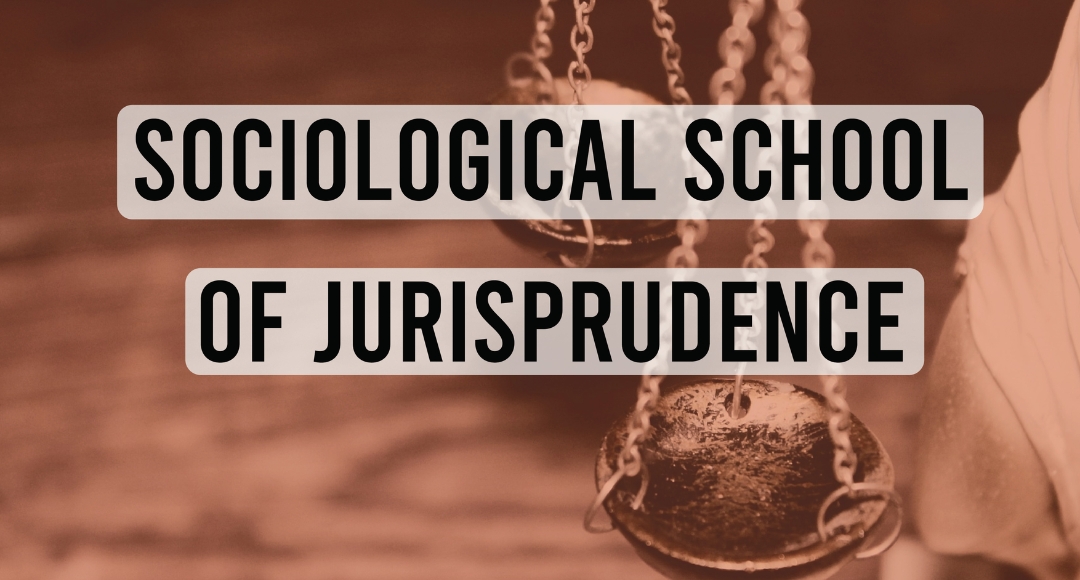Sociological School of Jurisprudence: Understanding Law in Society
Introduction
Law is not just a set of rules imposed by the government; it is a living system that evolves with society. The Sociological School of Jurisprudence emphasizes the relationship between law and society, arguing that law should be studied in its social context rather than in isolation. This school of thought considers the effects of laws on people and the changing needs of society.
In this article, we will explore the Sociological School of Jurisprudence, its history, key thinkers, principles, criticisms, and real-world applications to understand its significance in modern legal systems.
What is the Sociological School of Jurisprudence?
The Sociological School of Jurisprudence focuses on how the law interacts with social institutions, customs, and human behaviour. Unlike the Analytical School, which examines law as a logical system of rules, or the Historical School, which looks at legal evolution, the Sociological School sees law as a tool to shape and respond to society’s needs.

This approach considers law as a social institution that should be flexible and adaptable to the realities of human life. It suggests that the law should balance individual rights with social welfare and promote justice by considering economic, political, and cultural factors.
Historical Background
The Sociological School of Jurisprudence emerged in the late 19th and early 20th centuries, as societies underwent industrialization and social changes. Traditional legal theories were unable to address new challenges such as labour rights, urbanization, and economic inequalities. Legal thinkers realized that laws must evolve with society to maintain order and justice.
The foundation of this school was laid by legal philosophers and sociologists who believed that laws should be analyzed in relation to social behaviour, needs, and realities.
Key Thinkers and Their Contributions
1. Auguste Comte (1798–1857)
- The father of sociology, Comte believed that human societies evolve in stages.
- He emphasized that law should be studied as a scientific discipline connected to social change.
2. Roscoe Pound (1870–1964)
- One of the most influential thinkers of this school, he introduced the concept of “Social Engineering.”
- He argued that law should be used as a tool to balance competing interests in society, ensuring that individuals and the community coexist harmoniously.
- His key idea was that law should focus on achieving social justice and efficiency.
3. Émile Durkheim (1858–1917)
- A French sociologist, Durkheim studied how legal rules influence social cohesion.
- He divided law into “repressive law” (punitive laws in traditional societies) and “restitutive law” (restorative laws in modern societies).
4. Eugen Ehrlich (1862–1922)
- Ehrlich introduced the concept of “living law”, arguing that actual social norms influence legal development more than written laws.
- He believed that legal rules emerge from societal practices rather than formal legislation.
5. Leon Duguit (1859–1928)
- Duguit focused on the role of social solidarity in law.
- He believed that laws should be based on social cooperation and serve the interests of the people.
Core Principles of the Sociological School of Jurisprudence
The Sociological School is based on several fundamental principles:
- Law as a Social Phenomenon: Law does not exist in isolation; it develops in response to social, economic, and political changes.
- Law Should Promote Social Justice: The purpose of the law is to create harmony in society by balancing individual rights and collective welfare.
- Law Must Evolve with Society: As society changes, laws must also adapt to new realities to remain relevant.
- Legal Institutions Should Focus on Social Welfare: Courts, legislatures, and law enforcement agencies must consider the practical impact of laws on people’s lives.
- Law and Morality are Interconnected: Legal rules should align with societal moral values to ensure their effectiveness.
Application of Sociological Jurisprudence in Modern Law

The Sociological School of Jurisprudence has influenced many areas of modern law, including:
- Labour and Employment Laws: Laws related to minimum wage, working hours, child labour, and workplace safety are based on sociological principles that protect workers’ rights.
- Human Rights and Social Justice: Laws against discrimination, domestic violence, and caste-based inequalities reflect the idea that the law should promote social justice.
- Environmental Laws: Legal measures addressing climate change, pollution, and conservation are influenced by the need to protect society and future generations.
- Family Law: Changes in marriage, divorce, child custody, and inheritance laws show how family structures evolve and influence legal systems.
- Criminal Justice Reforms: Rehabilitative approaches in prison systems, juvenile justice, and victim rights are based on sociological principles.
- Cyber Laws and Digital Rights: The emergence of laws on data privacy, online harassment, and digital fraud highlights how law adapts to technological advancements in society.
Criticism of the Sociological School
Despite its influence, the Sociological School of Jurisprudence has some criticisms:
1. Lack of Fixed Principles
- Unlike other schools of thought, it lacks a clear and universal definition of law.
2. Overemphasis on Society Over Individual Rights
- Sometimes, focusing too much on social welfare can undermine personal freedoms.
3. Subjectivity in Lawmaking
- Laws based on social needs can be influenced by political and ideological biases.
4. Difficulty in Measuring Social Impact
- It is challenging to determine how effective laws are in solving social problems.
Despite these criticisms, the Sociological School remains relevant in shaping modern legal systems worldwide.
Conclusion
The Sociological School of Jurisprudence is an essential legal philosophy that bridges the gap between law and society. It recognizes that law should not be rigid but must evolve with changing social needs. By emphasizing justice, social welfare, and practical impact, this school has shaped modern legal systems in areas such as human rights, labour laws, criminal justice, and environmental protection. As society continues to change, the Sociological School will remain a guiding force in ensuring that laws serve the people effectively and fairly. Understanding this approach is crucial for anyone in the legal field, as it provides insights into how laws shape and respond to human life.
FAQs
1. What is the main focus of the Sociological School of Jurisprudence?
It focuses on the relationship between law and society, ensuring that laws meet social needs and promote justice.
2. Who is the founder of the Sociological School?
There is no single founder, but Roscoe Pound, Eugen Ehrlich, and Leon Duguit are key figures.
3. How does this school influence modern law?
It influences labour laws, human rights, environmental laws, criminal justice reforms, and digital rights.
4. What is “Social Engineering” in law?
Introduced by Roscoe Pound, it means using the law to balance competing social interests for justice.
5. What are some criticisms of this school?
Critics argue that it lacks fixed principles, can undermine individual rights, and is difficult to measure in impact.
Also Read:






